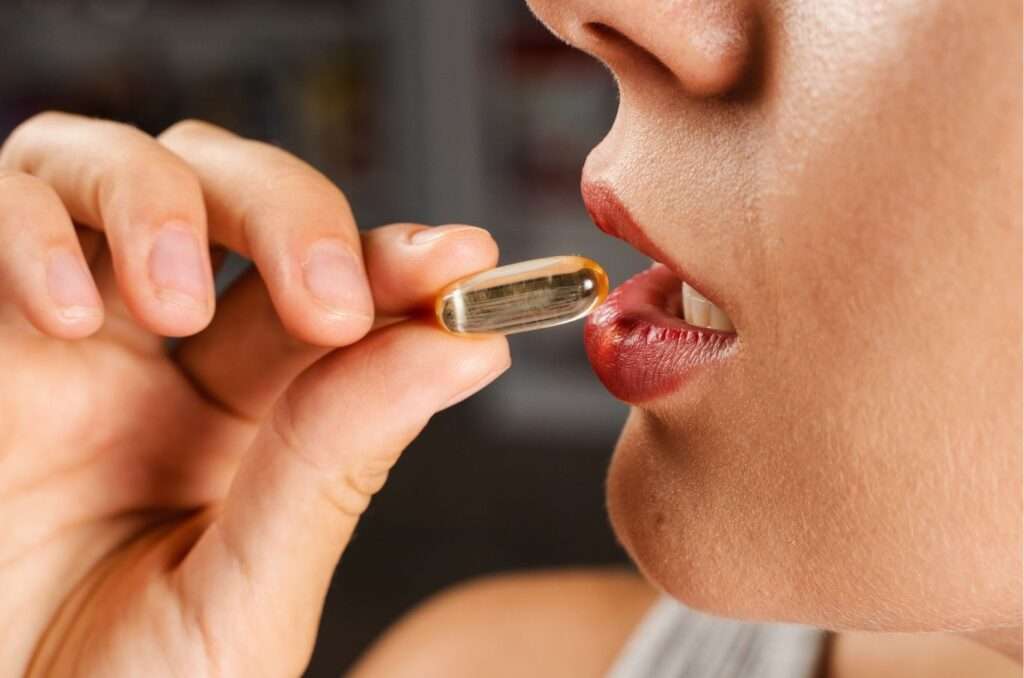Is your skin losing its glow, or are those joints feeling a tad more creaky than they used to? You’ve probably heard about collagen supplements promising to turn back the clock. Collagen is that magic protein that keeps our bodies’ connective tissues happy and healthy.
Lucky for you, this article breaks down the nitty-gritty of synthetic versus natural collagen — so you can make an informed choice for your health. Stay tuned; things are about to get “skin-teresting”!
Key Takeaways
- Natural collagen supplements come from animals and may be better absorbed by the body, but some people might have allergies or stomach issues with them.
- Synthetic collagen is made in labs and often has added nutrients. It’s consistent in quality and good for all diets, including vegans.
- Both natural and synthetic collagens have pros, like helping skin stay hydrated and nails strong, but neither is proven to aid weight loss or brain health.
- Side effects of collagen supplements can include upset stomachs or itchy skin but are mostly safe to try.
- Future trends in collagen could bring edible films, infused foods, tracking apps, and skincare products that go beyond gummies and powders.
Understanding Collagen

Hey there, folks—let’s dive into the world of collagen, shall we? This mighty protein is like the glue holding our bodies together, from the bounce in our skin to the strength in our tendons.
So grab a cuppa and get cozy as we unravel this powerhouse’s secrets and figure out why it’s got everyone buzzing.
The Role of Collagen in the Body
Collagen is like a super strong glue that holds your body together. It’s in your skin, bones, muscles, and tendons. Think of it as the thing that helps keep skin stretchy and joints moving smoothly.
Plus, it makes up a big part of your gut and helps with muscle building, too.
As we get older, our bodies don’t make as much collagen. That’s when we start to see wrinkles and feel joint pains because there’s less of this awesome stuff around to do its job. Next up: let’s dive into what natural collagen supplements bring to the table!
Types of Collagen
Collagen is like the glue that holds our body together. It’s a strong protein that you can find in your bones, skin, and muscles.
- Type I Collagen: This guy is super popular and helps keep your skin tight and your bones tough. It’s like the superhero of collagen types because it’s the strongest, making up most of our body’s collagen. You’ll find Type I in your skin, tendons, blood vessels, and organs.
- Type II Collagen: Think of this one as a cushion for your joints. It makes up the squishy cartilage that keeps your knees bending smoothly. You’d want this type if you’re looking to help with joint health or cartilage issues.
- Type III Collagen: This buddy tags along with Type I in keeping your skin looking good and helps build muscles too. If you’re working on getting fit or just want to keep your skin happy, give some cheers for Type III.
- Type IV Collagen: Here we have the behind-the-scenes hero that forms sheets instead of fibers and takes care of filtering stuff in layers found in skin layers.
- Vegan Collagen: Yep, there’s a plant-based option! Though not made by our bodies, it gives similar perks as animal-sourced collagen for all my fellow vegans out there.
Natural Collagen Supplements

Diving into the world of natural collagen supplements, we’re talking about those derived from – you guessed it – real, bona fide sources. I mean, nothing says ‘au naturel’ quite like sipping on some bone broth or popping a pill made with actual animal parts (just don’t think too hard about that part).
Pros of Natural Collagen Supplements
Natural collagen supplements are a big deal in the world of health. They come from sources like grass-fed cows and have lots of benefits for our bodies.
- Your skin looks better because these supplements help it stay stretchy, smooth, and hydrated.
- Nails get stronger, which means they break less often and look healthy.
- Many people blend them into their drinks, like coffee or smoothies, because they mix well without clumps.
- Natural options don’t have fake sweeteners or gluten, keeping things simple and clean for your body.
- They support your muscles and bones, too. That’s especially important as you get older to keep you strong.
- Since they’re just pure collagen with no extra stuff thrown in, your stomach can handle them better.
- These supplements make sure your body has enough building blocks to keep making its own collagen.
Cons of Natural Collagen Supplements
Natural collagen supplements are all the rage these days. They come from things like fish or cow skin, but they’re not always perfect. So, let’s dive into some downsides:
- Some tummies don’t agree with them. Yup, popping a few might leave you feeling like you wanna toss your cookies.
- It could take ages to spot any changes. You’ll need to wait around two months before your skin starts sending you thank-you notes.
- If you’re vegan, tough luck! Most natural collagen comes from animals, so finding ones that plants made is kinda hard.
- Don’t bet on slimming down. While we all wish for a magic pill, these supplements haven’t proven their chops in helping you lose weight yet.
- Watch out for the sweet trap! Collagen gummies sound fun but can be loaded with sugar—uh oh, there goes your healthy kick!
- They can be picky eaters. Combine them with the wrong drink and poof! You’ve just wasted your supplement because it won’t work as well.
- And hey, if you’re the type who reads every label for weird additives or follows special diets, some of these supplements might be off-limits.
Synthetic Collagen Supplements

Alrighty, let’s dive into the world of synthetic collagen supplements – you know, the kind whipped up in a lab rather than sourced from nature’s pantry. These man-made marvels pack a punch with their precision-engineered structures (that’s right, we’re talking about those sleek, shiny bottles promising eternal youth).
So grab your beakers and lab coats; it’s time to dissect what makes these futuristic formulas tick.. or should I say “rejuvenate”? Stay tuned as we unravel the pros and cons of choosing synthetic over grandma’s good old-fashioned bone broth – sci-fi skin secrets ahead!
Pros of Synthetic Collagen Supplements
Synthetic collagen supplements are quite the talk of the town. They’re popping up everywhere, from health stores to your buddy’s smoothie bowl.
- First things first, they are super easy to use. You just toss them into your drink—be it coffee, tea, or a shake—and you’re good to go.
- Now, because they’re man – made, makers can jazz them up with extra nutrients. Think vitamin C and hyaluronic acid for that bonus health kick.
- They also have a consistent quality. Since they’re made in a lab, every batch is just like the last one.
- No worries about allergies here. Synthetic options often skip stuff that might cause reactions, like gluten or dairy.
- Plus, they give your body’s collagen production a little nudge. This helps with skin hydration and can make those nails tough as nails!
- Another cool thing? These supplements don’t play favorites—they suit all diets. Whether you’re vegan or avoiding certain foods, there’s an option for you.
- You’ll also find these blends taste pretty good too. Remember how we said they could throw in some organic lemon or vanilla? Yeah, it makes all the difference!
- And you know what else? They’re designed to mix well with no clumping. So nothing weird floating in your drink.
- Lastly, for those on the go—it’s convenience at its best! Portable packets mean you get your fix anywhere; gym, office…skydiving?
Cons of Synthetic Collagen Supplements
Synthetic collagen supplements are not perfect. They might have some drawbacks you’ll want to know about.
- They may fall short in helping your body make its own collagen. Unlike what happens naturally inside you, these pills and powders don’t always kick your system into gear.
- Your body could struggle with them. See, the collagen is supposed to break down into tiny bits, easy for your insides to grab hold of. But sometimes, that just doesn’t happen right with the fake stuff.
- Worries over what’s mixed in are real. You might find unwanted nasties like heavy metals or even bugs that could harm you.
- If plants are more your jam, tough luck here. These man – made options aren’t from nature, so vegans and vegetarians don’t have a lot of choices.
- Yummy gummies? Not so fast! Sure, they taste good but watch out—they can be full of sugar and other iffy ingredients that do more harm than good.
Comparing Natural and Synthetic Collagen Supplements
Alrighty, time to pit natural against synthetic collagen supplements. It’s like a heavyweight bout, with each contender boasting its own fan club. You’ve got your natural collagen, strutting in from grass-fed, free-roaming cattle, and then there’s synthetic collagen, stepping out of the lab in a white coat, all shiny and new. Let’s throw them into the ring and see who comes out on top.
| Natural Collagen Supplements | Synthetic Collagen Supplements | |
|---|---|---|
| Source | Derived from animals, like fish or cows | Engineered in a lab, often plant-based |
| Compatibility | Closer to human collagen, better absorbed | May not mimic human collagen as closely |
| Eco-Friendliness | Depends on sustainable sourcing methods | Often more eco-friendly, less resource-intensive |
| Allergenic Potential | Potential for allergens due to animal sources | Lower risk of allergens, hypoallergenic options |
| Efficacy | Studies suggest it’s effective for skin and joints | Research is ongoing, results seem promising |
| Cost | Can be pricier due to sourcing and processing | Cost-effective production, often more affordable |
| Availability | Plentiful, given the meat industry’s byproducts | Emerging market, but getting easier to find |
So, there you have it—the tale of the tape. Each contender has its strengths and weaknesses, but the knockout punch might just be personal preference. Remember, though—just because it’s in a fancy jar doesn’t mean your body’s gonna be like, “Oh yeah, this is the good stuff!” Choose wisely, folks.
Collagen Supplement Trends: What’s Next After Gummies & Powders?
Gummies and powders have taken over the collagen supplement world, but get ready for something new. Think about sipping on your morning coffee with an extra boost of collagen peptides or stirring some into your oatmeal.
Yes, you heard that right – edible films and infused foods could be the next big thing! Imagine grabbing a nutrition bar packed with amino acids to replenish your muscles after a workout.
Now, don’t forget about skincare lovers; they’re in for a treat too. There’s talk about creams and serums that let collagen sink right into your skin. And if you love technology, how about apps that track how much collagen you need based on what you eat? The future looks bright (and smooth-skinned) with all these innovative ideas popping up! Keep an eye out because who knows? Your favorite snack might just get a “collagenous” makeover.
Potential Side Effects and Risks of Collagen Supplements
Some people taking collagen supplements might get an upset stomach or feel queasy. It’s kind of like when you eat something that doesn’t sit right – not fun, but usually not a big deal either.
Others may find their skin gets a bit itchy or they have to run to the bathroom more than they’d like. These things can happen because your body is getting used to the new stuff you’re putting into it.
Now, there’s some chat out there about how these supplements could help shrink your waistline, fix up your gut, or even make your brain sharper. But hold on – scientists haven’t really found strong proof for all that yet.
So if someone tells you collagen pills are like magic beans for everything from losing weight to super smarts, take it with a grain of salt (or maybe a whole shaker). Remember – if something sounds too good to be true, well..you know the drill!
The Verdict: Are Collagen Supplements Worth It?
You might be wondering if you should try collagen supplements. Think about your own health goals. If you want better skin or stronger nails, they could help a lot. Many people see their skin get more elastic and hydrated with these supplements.
Your nails might not break as much either.
Now, let’s talk facts – solid research backs up some of the big claims about collagen. It can play a nice part in bone and muscle health too. But don’t get caught up thinking it’s a magic pill for weight loss or brain power; the science isn’t quite there yet on those fronts.
However, most folks who try collagen don’t have bad reactions to it, so giving it a go is low risk if you’re curious! Just remember to eat healthy stuff like fruits, veggies, whole grains, nuts – because no supplement beats good old food when it comes to keeping you well from head to toe.
What Are the Pros and Cons of Using Synthetic or Natural Collagen in Supplements for Maximized Benefits in Your Diet?
When it comes to the benefits of collagen supplements, there are pros and cons to consider. Synthetic collagen may be more cost-effective and easier to produce, but some argue that natural collagen offers superior bioavailability and effectiveness. It’s important to weigh these factors when choosing the best option for maximizing the benefits of collagen supplements in your diet.
Conclusion
Okay, let’s wrap this up! Choosing between synthetic and natural collagen supplements is like picking a team – both have their superstars and benchwarmers. Natural has the whole ‘from nature’ vibe going on, while synthetic can be consistent and controlled.
Just remember, your body’s needs are unique – like how you prefer your coffee or what socks you wear for luck. Chat with a nutritionist or doctor if you’re scratching your head about which to choose.
Now go out there and keep those collagen levels happy!
For insights on the latest innovations in this industry, read about collagen supplement trends and emerging products beyond gummies and powders.
FAQs
1. Why do folks take collagen supplements, anyway?
Well, people grab these supplements to boost their muscle mass and skin elasticity. Collagen is a big deal for keeping your bones strong and helping with wound healing – gotta love that triple helix!
2. What’s so great about natural collagen in my diet?
Natural collagen comes from foods like chicken, fish, eggs… you know, the high-protein stuff. It helps keep your gut happy and can even make your skin look smoother (bye-bye wrinkles!). Plus, getting it from food means you’re likely rocking a balanced diet.
3. Can synthetic collagen really help my joints and bones?
For sure! In those shiny bottles of nutritional supplements, hydrolyzed collagen can get digested super easy and support bone density. Think less creaky knees and tougher bones – pretty neat for folks worrying about things like osteoporosis.
4. Any downsides to popping those synthetic collagen pills?
So here’s the thing… while they might give you some health benefits quicker than munching on a steak – because let’s face it who eats steak all day? There might be some extras in there that aren’t as cool as plain old vitamins or minerals.
5. Is marine collagen any different from other collagens out there?
Oh yeah! Marine collagen mainly comes from fishy friends under the sea – think scales and skins (sounds weird but works wonders). It mixes well with water (duh) which makes it easy-peasy to use in shakes or drinks.
6. Do I need to worry about side effects when taking these fancy supplements?
You gotta watch out sometimes – too much of anything isn’t cool right? Keep an eye on added sugar intake or weird reactions if you have allergies or certain conditions like acid reflux or heart issues. And hey – don’t just believe everything you read on the bottle; check what the FDA says too!





